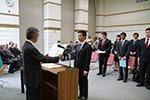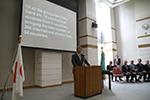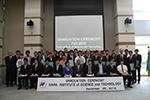2015/09/30
On Friday, September 25, 2015, a graduation ceremony was held in the Training Hall on the 1st floor of Interdisciplinary Frontier Research Complex No.2.
President Ogasawara presented degrees to each graduate and gave the congratulatory speech to the 30 graduates.
After the ceremony, the commemorative photograph was taken and the graduates enjoyed the graduation ceremony with the president, executive directors and their supervising professors.
*Number of Graduates in September
【Master's Graduates】
Information Science 9
【Doctoral Graduates】
Information Science 10
Biological Sciences 7
Materials Science 5
【Graduates who completed the Doctoral program by submitting the dissertation】
Biological Sciences 1
Total 32
Congratulatory Remarks to Graduating Students
I would like to offer my heartfelt congratulations to 9 master's and 23 doctoral students who have been awarded degrees today.
Of all the graduates today, there are 19 international students from 8 countries, bringing the total number of 364 international alumni from 54 countries.
It pleases me greatly to see our alumni network continuing to expand throughout the world.
Two weeks ago, I visited Indonesia to attend the NAIST Alumni meeting.
In Indonesia, there are more than 30 NAIST alumni working diligently at various educational and research institutions.
Two of those alumni have been selected as ones of the Top 100 Researchers in Indonesia.
Moreover, many of our alumni have initiated new research projects at Gadja Mada University, Bogor Agricultural University, the University of Indonesia, and many more notable universities in Indonesia.
It was such a honor to hear accomplishments of our distinguished alumni and their colleagues. We had fruitful discussions with them on how NAIST can contribute further to their research activities.
NAIST's roles do not end with us sending you out into society.
Rather, the NAIST faculty considers our role as building relationships with the alumni so that each and all of you will be able to continue your creative lives in an ever-changing community of science and technology.
It is my biggest hope that our alumni network continues to grow not only in Indonesia, but also in the entire world.
While a number of the master's students graduating today will continue on to the doctoral programs, the majority of you will begin new, independent lives as researchers, engineers, or professionals with the degrees conferred today.
We now face a drastic change in the fields of science and technology. At a meeting to discuss the advancement of science and technology in Japan, the Ministry of Education, Culture, Sports, Science and Technology (MEXT) once mentioned:
At the forefront of today's research are breakthroughs in measurement, analysis, and computational technology that are rapidly expanding our understanding of natural and social phenomena. Consequently, scientific research itself is rapidly expanding and is in a constant state of flux, against the backdrop of: ongoing increases in the amount of information available on internet and drastic progress in computational science that are bringing about faster information processing speeds; and the development of transportation and telecommunications networks that make possible unprecedented speed in the dissemination and sharing of information. In broad domains such as life science and materials science, new interdisciplinary and multidisciplinary fields are being developed, and the frontiers of knowledge are being expanded rapidly.
Dramatic improvement of computer performance has led to the development of simulation technology, which overrides conventional ways of conducting experimental research to predict the unknown. Moreover, availability and accessibility of various "big data (such as genome data, earth observation data, and human activity data) have created needs and opportunities for generating new knowledge.
Implementation of ICT (information and communication technology) to societies with diverse sociocultural backgrounds can create a whole new social systems that may affect the entire world. ICT is becoming a driving force for further advancement of science and technology.
Data-Driven Science becomes a new paradigm in the field of life science to support understandings of not only how model organisms act in experimental conditions, but also how various organisms behave in natural environments. Such a new approach can help us gain ideas on how to protect and conserve biodiversity.
The principles of informatics have become applied to the field of materials science in order to better process vast amount of data related to materials... as we know it as Materials Informatics. Science and technology will continue to progress...
going far beyond our imagination we can possibly embrace today.
As a graduate of NAIST, I would like you to actively approach creating a new society and world by creating and practicing new science and technology.
So... let me ask you all. What can you do to contribute to such social innovation? In this regard, I'd like to you all pay special attention to the following part of a report published by a committee of MEXT:
In the current era of rapidity expanding frontiers of knowledge, it is of utmost importance for researchers to challenge themselves to cultivate new knowledge based on their own knowledge, creativity and research skills, and it is vital for researchers to keep in mind and clarify the significance of their own research subject (challenger spirit). To cultivate new knowledge, of course, it is necessary to place a high value on diversity and knowledge of traditional research fields. In addition, in the current era, you must maintain a broader, comprehensive view to avoid compartmentalized knowledge (well-roundness). You are also faced with demands to produce new academic domains through cooperation and collaboration with researchers from various fields and a broad range of domestic and foreign counterparts (muti-disciplinary). Furthermore, through discussion and verification within the global science community, you must strive to obtain global recognition of your research excellence byproposing new research frameworks, thus contributing beyond national borders (global perspective).
I hope all of you will become an advocate for the creation and implementation of innovative science and technology.
During your years at NAIST, you have not only gained academic expertise but also developed the ability to identify problems, explore and implement solutions to these problems, evaluate the outcomes, and write academic papers on the outcomes though discussions with people having various viewpoints. I am confident that such experiences at NAIST, along with the network you will establish here, will help you all lead creative lives.
In concluding my message, I would like to congratulate you all again. We look forward to your future success, and we will continue to support your future endeavors.
Naotake Ogasawara,
President
Nara Institute of Science and Technology,
September 25, 2015







